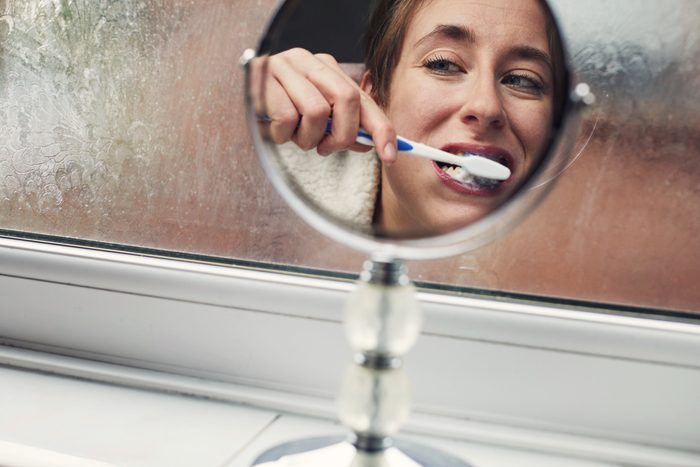Black Spot on Tooth: Just a Cavity, or Something More?
Updated: Nov. 30, 2022

Discolored teeth or unusual spots on your teeth? Be safe and get it checked out.
During a routine check in your rearview mirror for food in your teeth, you notice an unusual black spot on a tooth. It’s not necessarily a problem, but it’s still a reason to see your dentist.
“If you see it, if it doesn’t look right, see your dentist,” said Tricia Quartey-Sagaille, D.M.D., F.A.G.D and spokesperson for the American Dental Association. “Don’t wait until it hurts or gets bigger.”
Get The Healthy @Reader’s Digest newsletter
What does a black spot on your tooth mean?
Black or dark spots on teeth are not uncommon. They can be signs of tooth decay, staining of the teeth or even an old filling that you forgot about, Quartey-Sagaille said.
If it is tooth decay, that’s something that needs to be treated. Your dentist can do that and give you tips for keeping your teeth healthy.
Tooth decay, or a cavity, can come along with:
- A toothache
- Sensitivity to hot and cold
- Pain when eating
“But if it doesn’t hurt, that doesn’t mean it’s nothing,” Quartey-Sagaille said.
White Spots on Your Tongue? Here’s What They Could Mean for Your Health
What are other signs of tooth decay?
Signs of tooth decay aren’t always dark either. “You should also look for white spots,” Quartey-Sagaille said. “They can be an early sign of a cavity.”
Spots on teeth can also be yellow or orange. They might be the result of an injury rather than tooth decay though.
“Teeth can change colors as a result of trauma,” Quartey-Sagaille said. “It doesn’t usually show up as a spot.”
10 Things Dentists Always Do to Prevent Tooth Decay
What should you do if you see a black spot on your tooth?
The best way to respond to any new, changing or unusual spots on your lips, tongue or in your mouth is to schedule an appointment with your dentist to get the spot looked at.
If the spot is decay, it should be filled as soon as possible, since tooth decay allows bacteria and acid to get inside the tooth. If a spot is the result of an injury, your dentist will evaluate it and determine the appropriate treatment.
“You should definitely not wait because it can continue to get bigger and become a more involved process or become beyond repair,” Quartey-Sagaille said.
Finally, let a professional check your tongue and mouth for unusual spots with regular dental checkups. Quartey-Sagaille recommends every 6 months, unless you see something concerning. Then go in sooner.
For more wellness updates, follow The Healthy on Facebook, Instagram, and Twitter. Keep reading:
